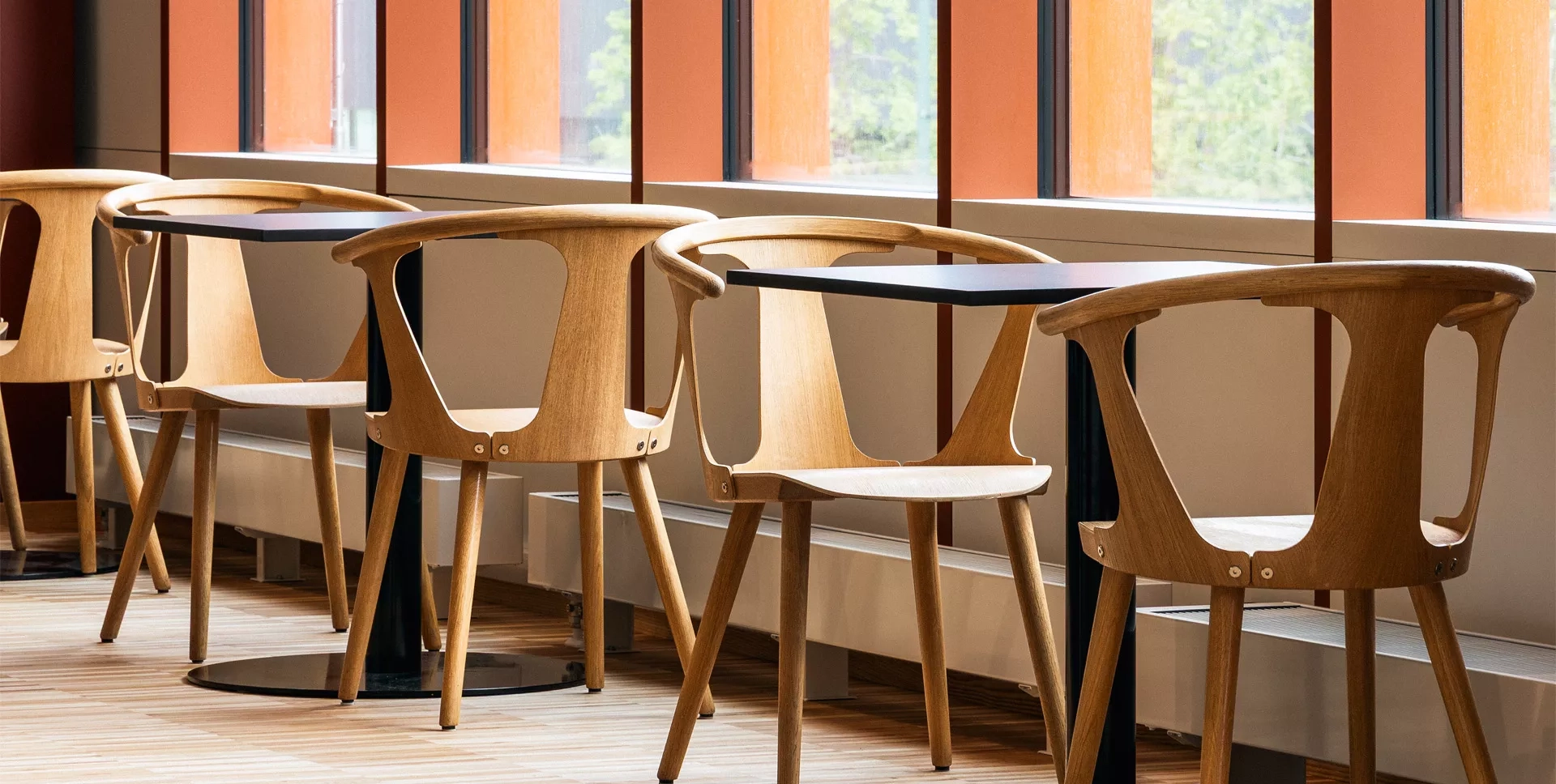Validated by RISE
CO2e calculation for reuse, validated by RISE
Choosing reused furniture from Yllw Factory genuinely reduces climate impact. For every item we source, refurbish and resell, we calculate the avoided CO2e compared with an equivalent newly manufactured product. Our methodology has been reviewed and validated by RISE Research Institutes of Sweden.
Independent validation
RISE confirms that our methodology is scientifically robust and suitable for communicating environmental benefits.
Substitution principle
Each refurbished item replaces the need for a functionally equivalent new product.
Traceable reporting
We present savings per item, per project, and as a total summary for the delivery.
Select a product to compare climate data
Calculator with tabs for different products. Choose a tab to hear figures for new production, reuse and refurbishment, plus percentage reduction.
Use the left and right arrow keys to switch tabs.
Figures for office chair
percentage reduction compared with new production
percentage reduction compared with new production
How we calculate
1. Define the comparison product
For every reused furniture item, we determine a functionally equivalent new product to compare against.
2. Use relevant sources
We start from Environmental Product Declarations and complement them with quality-assured emission factors from research and industry data.
3. Calculate avoided emissions
The CO2e saving equals the emissions linked to new production minus emissions related to reuse such as inspection, refurbishment and spare parts. Transport and operation are considered marginal in this context and are included where they affect the result.
4. Report at multiple levels
We show results per item, per project and as a total summary, providing clear follow-up and decision support.
What RISE has validated
Scientific basis
The methodology is grounded in established scientific principles.
Clear substitution
A refurbished item replaces a functionally equivalent new product.
Relevant assumptions
Assumptions regarding functional equivalence, transport, operation and the use of EPDs are justified and in line with practice.
Sources aligned with research
Emission factors are consistent with research, industry data and Scandinavian sources.
Frameworks and standards
The frameworks and standards we rely on to make calculations comparable, traceable, and easy to communicate.
ISO 14040 and 14044
Life-cycle perspective and clear system boundaries for traceable calculations.
WBCSD Guidance
Guidance for calculating and reporting avoided emissions.
Avoided Emissions Framework
Supports a methodology that enables comparability and credible communication.
CO2e savings from reuse – scale by headcount
This tool estimates CO2e savings from reusing office furniture. The calculation assumes one typical workstation per person, and you can choose to include a rule-of-thumb bundle for shared areas. The values are based on common, representative products and should be treated as indicative — your actual savings may be lower or higher depending on your specific models, quantities, and materials. For a project-specific assessment we can prepare a detailed calculation tailored to your setup.
Use the slider to choose the number of people. Tick the checkbox to include shared areas. Results update automatically.
1 workstation/person with: desk 140×80 cm, task chair, desk lamp, pedestal, cable tray, desk screen 140×70 cm, powerdot, and waste bin.
Total: 377.85 kg CO2e per person.
Adds typical furniture for meeting rooms, pantry/dining, lounge and storage. Stated per 10 people for simple scaling.
Total: 1,320 kg CO2e per 10 people (= 132.0 kg CO2e per person).
Per person = 377.85 kg (workstation) plus 132.0 kg if shared areas are included.
Total = (per person) × (number of people).
Show detailed calculation
Workstation per person (items × saving):
- Desk — 121 kg × 1 = 121 kg
(Height-adjustable, L140×W80 cm) - Task chair — 112.85 kg × 1 = 112.85 kg
(With armrests & headrest, padding and upholstery) - Desk screen — 50 kg × 1 = 50 kg
(Fully upholstered, W140×H70 cm) - Pedestal — 50 kg × 1 = 50 kg
(Wood, pull-out drawers) - Waste bin — 22 kg × 1 = 22 kg
(Plastic) - Cable tray — 10 kg × 1 = 10 kg
(Simple metal model) - Desk lamp — 7 kg × 1 = 7 kg
(Simple model, ~2 kg) - Powerdot — 5 kg × 1 = 5 kg
Workstation subtotal: 377.85 kg CO2e per person.
Shared areas (per 10 people):
- Conference table — 159 kg × 1 = 159 kg
(Robust steel frame, laminate top, L300×W120 cm) - Conference chair — 46 kg × 8 = 368 kg
(Steel, plastic shell, upholstered seat, castors) - Whiteboard — 48 kg × 1 = 48 kg
(Wall-mounted, 100–300 cm) - TV stand — 54 kg × 1 = 54 kg
(Metal with castors) - Ceiling light — 15 kg × 2 = 30 kg
(Simple model, ~5 kg) - Dining table — 25 kg × 1 = 25 kg
(Wood frame, laminate top, L200×W100 cm) - Dining chair — 40 kg × 6 = 240 kg
(Wood chair with upholstered seat & back) - Floor lamp — 15 kg × 2 = 30 kg
(Simple model, ~5 kg; two units — pantry/dining and lounge) - Sofa — 116 kg × 1 = 116 kg
(Wood frame, fully upholstered with padding, W200 cm) - Armchair — 59 kg × 2 = 118 kg
(Wood frame, fully upholstered) - Pouffe — 28 kg × 1 = 28 kg
(Wood frame, fully upholstered) - Coffee table — 28 kg × 1 = 28 kg
(Tabletop 10–19 mm, frame and top in wood, L100×W60 cm) - Cabinet — 38 kg × 2 = 76 kg
(H80×W80×D40 cm, wood, with sliding doors or hinged doors)
Shared areas subtotal: 1,320 kg CO2e per 10 people = 132.0 kg per person.
How much CO2e can your project save?
Get a traceable summary of the climate benefit for your delivery. We calculate per item and per project and provide figures suitable for procurement and sustainability reporting. In our reference projects you can see how much CO2e each project saved. You are also very welcome to contact us for a climate-smart approach to your next project.
